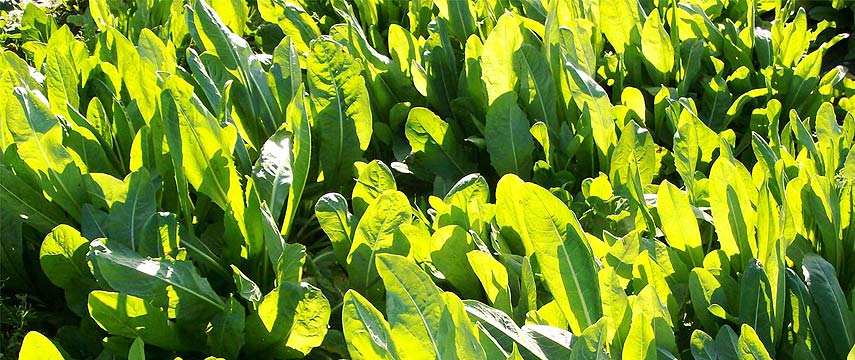Pasture Herbs

What sort of pasture herb are you after?
We stock:
Chicory:
(Sowing Rates: Mixed: 1-2 kgs per ha. Alone: 4-6 kgs per ha)
Chicory is a tap rooted perennial herb with excellent animal production potential. It provides a leafy, high-quality feed over spring, autumn and when other pastures lack quality. The stock health benefits of adding chicory to your pasture seed or brassica mix are very well documented. They include good summer activity, high pasture quality, improved live weight gains and is suitable for all stock types. Better suited to free draining soil types, that are thistle free. Newer cultivars are select for increased dry matter yields and persistence.
Antler Chicory: – Antler Chicory will accumulate minerals naturally. A good source of the trace minerals potassium, calcium, magnesium, sulfur, zinc, and sodium, Antler Chicory will also help control gastrointestinal nematodes.
Chico: – Chico is a high yielding, very high quality and leafy chicory showing fast establishment, rapid re-growth, strong insect resistance and good drought tolerance.
Choice: – Grasslands Choice was bred in New Zealand, selected for high dry matter production, improved cool season growth, reduced lactenin levels, and improved persistence.
Puna 2: – Grasslands Puna II is a New Zealand bred broad-leaved, perennial forage herb bred from true perennial chicory parents. Puna II has high nutritional quality, producing high yields from spring to late autumn.
Punter: – SF Punter provides high energy forage with proven animal health benefits and increased animal production. Very strong summer and autumn growth as well as very good cool season production.
501: – Best suited to a 6-8 month summer crop, rapid establishment and excellent re-growth, very high DM yield, erect growth habit providing high utilization and low crown to reduce Sclerotinia.
Plantain:
(Sowing Rates: Mixed: 500 grams to 1.5 kgs per ha)
A deep rooted pasture herb that is almost a standard edition to both pasture seed and brassica sow down projects. Contains well proven higher levels of trace elements than ryegrasses and can also significantly improve the paddocks dry matter yield and also stock liveweight gains.
Agritonic: – is a forage plantain from the breeding programme that created Tonic; it maintains many of the seasonal growth features of Tonic while having an increased leaf number. During
autumn establishment Agritonic can have a greater density of leaves which may be not as large as Tonic’s.
Boston: – Boston is a New Zealand plantain which is a rapid establishing, cost effective, deep rooted, drought, heat and cold tolerant, mineral rich, tender leafy green perennial pasture herb.
Captain: – A ‘cool season plantain (CSP)’ due to its extra growth in this period, the most valuable feed in farm systems, with environmental advantages too. Captain also has excellent summer yield and drought tolerance.
Ecotain: – Ecotain combines four modes of action that work together to significantly reduce N leaching from the urine patch.
- Dilute: Ecotain environmental plantain increases the volume of urine animals produce, which means the N being excreted is in a more dilute form, resulting in a reduced N load in the urine patch.
- Reduce: Ecotain reduces the amount of dietary N which is excreted in urine, compared with ryegrass. This reduces the amount of N released into the soil via the urine patch.
- Delay: In urine patches from animals grazing Ecotain, the conversion from ammonium to nitrate is delayed. Slower conversion allows plants a greater opportunity to uptake N, significantly reducing the potential for leaching.
- Restrict: The presence of Ecotain plants in the soil reduces nitrification, likely through the effect of a biological nitrification inhibitor.
Oasis: – Oasis is the latest plantain release from Seed Force. Selected for its persistence and uniformity; Oasis is a mid-flowering variety (approx. two weeks later than Tonic) that is cool season active. Suitable for all stock classes, plantain is a useful addition to perennial pastures due to its ability to help mitigate N leaching while boosting pasture production and animal performance.
Oracle: – Is a late heading, broad leafed plantain bred for high forage yields under grazing. Has very strong year-round growth, especially over the late spring, summer and autumn months. Has deep fibrous roots enabling good heat and drought tolerance.
Tuatara: Tuatara is a fast-establishing species, productive and persistent over a broad range of soils and climatic conditions, particularly less fertile soils and dryland regions.
Sainfoin:
Sainfoin is a Non bloating forage perennial legume herb that is highly palatable to animals and has an excellent nutritional balance. It can be grazed or fed as hay or silage. Sainfoin has a tap root that grows down to great depth, making the plant highly drought tolerant and the ability to draw up minerals from well below the topsoil. Unlike many other legumes, Sainfoin is non-bloating and is known to have anthelmintic properties. The result is that animals grazing sainfoin has very rapid live weight gains.
Yarrow:
(Sowing Rates: Mixed: 500 grams to 750 grams per ha)
Yarrow is a common herb that can be included in any of our seed mixes. It is most effective in dry land areas where Yarrow shows its high drought tolerance.
Phacelia:
(Sowing Rates: 4 – 6 kg per ha)
Phacelia is a versatile plant that is used extensively in Europe, both as a cover crop and as bee forage. It is increasingly used in vineyards where it is quick to grow and flower and grows well in dry soil. Phacelia is listed as one of the top 20 honey-producing flowers for honeybees and is also highly attractive to bumblebees and syrphid (hover) fly.
